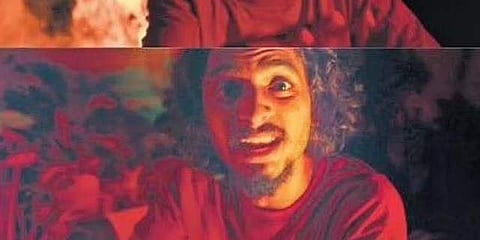
- LIFESTYLE
- FASHION
- FOOD
- ENTERTAINMENT
- EVENTS
- CULTURE
- VIDEOS
- WEB STORIES
- GALLERIES
- GADGETS
- CAR & BIKE
- SOCIETY
- TRAVEL
- NORTH EAST
- INDULGE CONNECT

It’s angry, powerful and sharp. These are some words to sum up Mangosteen Club’s recent offering. In many ways, Strike(n) is a new step for the band — made up of like-minded, music-loving and socially conscious youngsters. It’s the band’s first rap song, and first full-length, studio-produced track.
The first thing that hits you is the visuals. The television in the video shows police beating up protesters in Delhi with their lathis. The visual changes to Eri (real name Devadarshan) standing on a green field. Words come out like a waterfall or even like a thunderstorm. It’s fast, to the beat, and you can’t help but feel all the anger in his words.
“The farmers’ strike affected us, especially me, in a profound way. It’s not that I didn’t see anything else that was happening. But the strike that went on and on, farmers dying due to exhaustion during those long months, and the government never even saying a word about it — I couldn’t just keep it in. I wrote the song before the government withdrew the farm laws,” says Eri, who used to be a supporter of the band from behind the scenes.
Mangosteen Club was planning to release a rap song by Eri for a long time. “The process was long. It took one year to finish it. I wrote the lyrics and Elektronic Kili produced the song. It took time to get the right beat and visualise how the song unfolds,” says Eri.
According to Vishnu Vilasini Vijayan, one of the four founders of the band, the band released other projects in the meanwhile. “Strike(n) was supposed to be our main project, we wanted it to leave a mark. This is us, in a way, becoming more serious about the band and music,” he says.
He is right. Strike(n) begins a new journey for the band, graduating from their self-proclaimed amateur status. The song released on their YouTube channel has received positive responses from listeners, especially for their strong political views.
“When then US President Donald Trump visited India, the government covered up the sides of the road from the airport to the venue in Gujarat, to hide poor communities. Probably because their lives don’t have aesthetic value according to the government. Such obvious class and caste discriminations provoked me a lot,” says Eri.
He is right. The lyrics are a testament to what a generation of people might feel. The combined agony and rage are masterfully packed into the Malayalam rap song. In a way, such a powerful performance in Malayalam is happening after a long time.
Just like the events that led to the music, Eri took his time to form the words. “Some lines and words were humming through my mind for long. I dont have a special process. Words come to me while I am showering, doing something mundane. I remember them and scribble them down. When the band decided to produce a rap song, I sat down and wrote everything together. Slowly, I realised there is enough material for a full-length song,” he says. After the lyrics were finalised with multiple group discussions, the band roped in Electronic Kili for the music. It took them some time to express all those poetic rages into music, they say.
The next step was the video. “We needed it to be as significant as the lyrics. That’s why we thought the snippets from real-life, things that actually went down in Delhi, will add more to it. It took some time to coordinate it though,” says Vishnu, who directed the video.
When Eri sings, “Even then you say, we are the children of one mother”, we feel the irony along with him — the injustice of it.
https://www.youtube.com/watch?v=PEn4ALl8tUQ